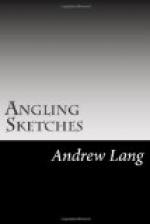[ANGLUS crawls on his belly into a tuft of nettles, where he kneels and flicks his fly for about ten minutes.
Anglus.—Alas, he has ceased rising, and I am grievously entangled in these nettles. Come, Scholar, but warily, lest ye fright my fish, and now, disentangle my hook.
Scotus.—Here is your hook, but, marry, my fingers tingle shrewdly with the nettles; also I marked the fish hasting up stream.
Anglus.—Nay, come, we shall even look for another.
Scotus.—Oh, Master, what is this? That which but now was dry ditch is presently salad bowl! Mark you how the green vegetables cover the waters! We shall have no sport.
Anglus.—Patience, Scholar; ’tis but Master Hedgely’s men, cutting the weeds above. We may rest us some hour or two, till they go by. Or, perchance, for a matter of five shillings—
Scotus.—Nay, Master, this English angling is over costly. The rent of your ditch is high, the expenses of travel are burdensome. In crawling through your nettles and thistles I have scratched my face, and torn my raiment, and I will not pay the labourer to cease labouring in his industry.
Anglus.—Why then, pazienza, Scholar, or listen while I sing that sweet ditty of country contentment and an angler’s life, writ by worthy Master Hackle long ago.
SONG
The Angler hath a jolly life
Who by the rail runs down,
And leaves his business and his wife,
And all the din of town.
The wind down stream is blowing straight,
And nowhere cast can he;
Then lo, he doth but sit and wait
In kindly company.
Or else men turn the water off,
Or folk be cutting weed,
While he doth at misfortune scoff,
From every trouble freed.
Or else he waiteth for a rise,
And ne’er a rise may see;
For why, there are not any flies
To bear him company.
Or, if he mark a rising trout,
He straightway is caught up,
And then he takes his flasket out,
And drinks a rousing cup.
Or if a trout he chance to hook,
Weeded and broke is he,
And then be finds a goodly book
Instructive company.
What think you of my song, Scholar? ’Tis choicely musical. What, he is gone! A pest on those Northerners; they have no manners. Now, methinks I do remember a trout called George, a heavy fellow that lies ever under the arch of yonder bridge, where there is shelter from the wind. Ho for George!
[Exit singing.
SCENE II.—A BRIDGE
Enter ANGLUS
Anglus.—Now to creep like your Indian of Virginia on the prey, and angle for George. I’faith, he is a lusty trout; many a good Wickham have I lost in George.
[He ensconces himself in the middle of a thorn bush.
Anglus.—There he is, I mark his big back fin. Now speed me, St. Peter, patron of all honest anglers! But first to dry my fly!




